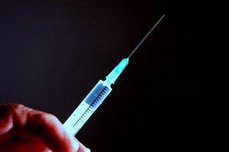 On March 24, 1976 then-President Ford went on national television warning of an epidemic, and asking Congress for $135 million "for the production of sufficient vaccine to inoculate every man, woman and child in the U.S."
On March 24, 1976 then-President Ford went on national television warning of an epidemic, and asking Congress for $135 million "for the production of sufficient vaccine to inoculate every man, woman and child in the U.S."Vaccine manufacturers insisted on special liability protections which were granted by Congress. 4 months later, after vaccinations began, the complaints of side effects (and lawsuits) began to pile up. Over $3.2 billion's worth, with Congress shelling out some $90 mill after most cases were settled or dismissed.
Oh, and the swine flu? Well, that never showed up. As Laurie Garrett points out in Foreign Affairs ("The Next Pandemic?" July/August 2005) :
"The head of the CDC was asked to resign, and Congress never again considered assuming the liability of pharmaceutical companies during a potential epidemic. The experience weakened U.S. credibility in public health and helped undermine the stature of President Ford. "
Garrett quotes from the report of Dr. Harvey Fineberg, who was asked to give an assessment of what went wrong:
"In this case the consequences of being wrong about an epidemic were so devastating in people's minds that it wasn't possible to focus properly on the issue of likelihood. Nobody could really estimate likelihood then or now. The challenge in such circumstances is to be able to distinguish things so you can rationally talk about it. In 1976, some policymakers were simply overwhelmed by the consequences of being wrong. And at a higher level [in the White House] the two- likelihood and consequence -got meshed."There are some obvious differences between what is happening now, for one, European authorities are not mocking us for going overboard. Public health crises scenarios are indeed scary, especially considering some 75% of diagnosis labs in NYC are apparently already reporting being overwhelmed and there is no current crisis. That said, no doubt 'Katrina stress' is still on Bush's mind as he responds to these issues. (Of course, the Dems are whining opportunistically that it's all not enough, as though they are incapable of accomplishing anything other than finger-pointing...)
Read the rest of Garrett's comprehensive report here.
